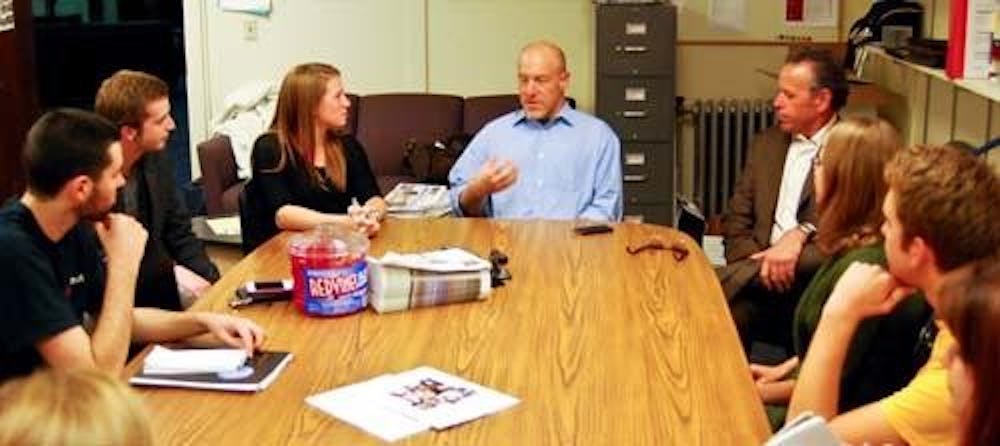New York Times journalist Mark Leibovich kicked off the Vote UP program by sharing his own experiences covering politics
(Giovanna Solano | THE BEACON)
By Megan Walsh, Staff Writer walsh15@up.edu
After being introduced as the man who claims to have lowered the dress code bar, New York Times journalist Mark Leibovich took the stage in jeans as his audience laughed and applauded. The same man who has spoken with countless politicians, including asking President Obama which position Vice President Biden would play on a hypothetical basketball court, took time out of his busy schedule to speak to the University of Portland community Tuesday night.
Leibovich, chief national correspondent for The New York Times Magazine, visited campus to share his experiences and knowledge as a political journalist. Not only did Leibovich kickoff Vote UP, sponsored by the political science department, the Moreau Center and the office of Student Activities, but he also gave the audience insight into his career and his opinion of the current political situation.
"One thing I feel very strongly about, as a political reporter for ten years now: I have become very non-partial," Leibovich said. "That sounds a little odd, but I think that the more you get to know politicians and the closer you get to the process, the more you realize that there are really good people on both sides and there are really bad people on both sides."
Leibovich kept his non-partisan viewpoint in effect throughout, critiquing politics as a whole, yet never blaming a specific side.
"I have a much greater yearning right now for politics to actually be as good as the people of this country are, and as big as the problems in this country are," Leibovich said. "The system is pretty broken, but I also think it can be redeemed by people who believe very much in what they do and have very good intentions."
Although the past few decades have been tough on print journalism because of news accessible via the Internet, Leibovich did not show any note of discontent. His passion for his job was apparent, especially when he told an anecdote about a story he wrote on Hillary Clinton.
"One of the great serendipitous moments I had as a reporter was that I figured everyone knew everything about Hillary Clinton," he said. "I came across a guy who was a professor and turned out to be a high school friend of Hillary Clinton's. He went off to Princeton whereas she went off to Wellesley, but they became pen-pals."
After calling Clinton's college pen-pal, Leibovich immediately booked a flight to California to see and read the letters.
"The Hillary Clinton I had known for the past few years was the public figure who was scripted and very guarded and wary of the world," Leibovich said. "Here was this 19-20 year old young woman writing far more eloquently and smartly about her life and self doubts. I was able to use these letters in my story."
Leibovich said instances like that, finding the story behind a story, are the roots of his love for journalism.
Leibovich covered many topics within his hour-long speech, including, yet not restricted to politics, facts about his profession, and his opinion about the upcoming election.
"I liked most how he acknowledged that the deeper he got into it, the more he became not really related to a party specifically, and how he said you become more nonpartisan the more you delve into it," senior Andriana Alexis said. "I thought that was an interesting perspective to take and then to talk about why that is."
Even with a day filled with events, including a visit to a US political science class and The Beacon newsroom, Leibovich referred to his UP visit as a "detox" after covering the Democratic and Republican conventions.
"The most interesting thing I found about this speech was probably how even keel he was," senior Todd Tully said. "In a lot of his articles, he talks about being a pessimist, but in this speech there was a real air of optimism."
When the Q and A portion of the night came around, a wall of hands shot into the air and did not thin until it was announced that time was up. The audience asked questions ranging from how one detaches from interview subjects to what should be expected in the upcoming debates.
"We're in a time where anyone can be a part of the conversation," Leibovich said. "Anyone can be engaged in some sort of investigative reporting where, if you see something going on, you can take a picture of it and post it on a blog and the world can change."
Mark Leibovich, New York Times Magazine chief national correspondent, lectured about journalism and politics Tuesday. Leibovich spoke to a packed crowd in the Bauccio Commons. (Giovanna Solano | THE BEACON)
Part of Leibovich’s visit on campus included a stop in The Beacon newsroom. Leibovich also popped into a political science class during his time on The Bluff. (Giovanna Solano | THE BEACON)








